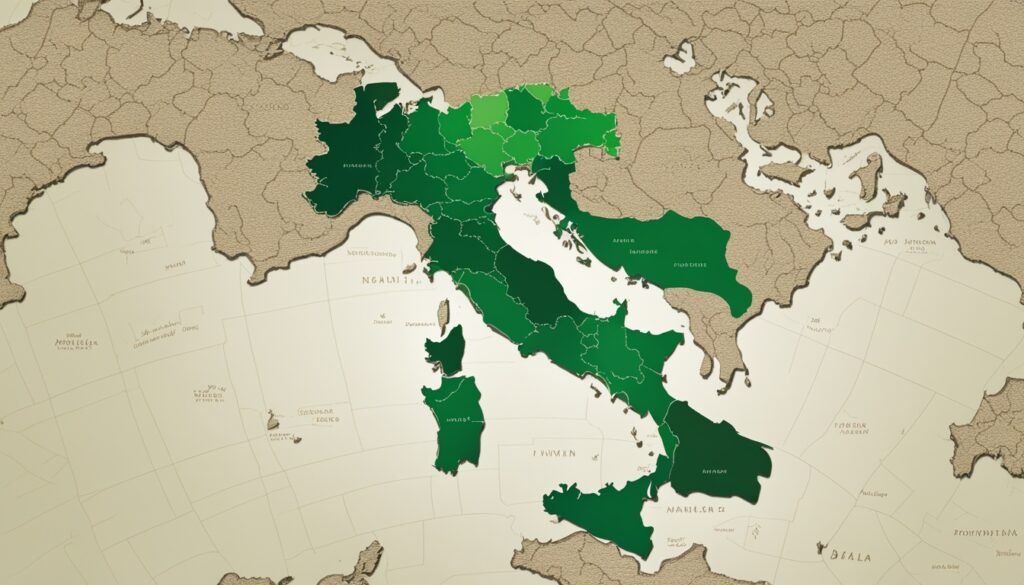Embarking on the journey of purchasing real estate in Italy as a foreigner is an enticing prospect. It opens a world where the splendor of the Mediterranean meets rich cultural heritage. Whether for a vacation home or an investment, knowing the legal requirements for foreigners buying property in Italy is paramount. The beauty of Italy isn’t just in its landscapes but also in its property ownership rules for expats in Italy, which cater to a wide array of personal preferences and investment strategies1.
Still, caution and thorough research are advised. Over half a decade spent within its borders revealed to countless expatriates the complex yet manageable nuances of the Italian property market—from seismic risks assessment to the lure of tourist-frequented locales offering optimal rental yields through services like Airbnb1. Indeed, Italy not imposing capital gains tax on properties after five years is an encouragement for those eyeing long-term investments1. Can foreigners buy property in Italy? Absolutely, and with the right approach, buying property in Italy as a non-resident can be both a dream realized and a wise financial move.
Key Takeaways
- Understanding the property purchase process in Italy is critical for non-residents and expats1.
- Factors such as location, climate and amenities should influence the buying decision1.
- Italy offers significant tax advantages for real estate held over five years1.
- Assessment of natural risks is vital when selecting Italian real estate1.
- Rental yields are often highest in tourist areas and cities1.
- Homeseekers should prioritize their personal needs and lifestyle preferences when selecting a property1.
Understanding Italian Real Estate Laws for Foreigners
The acquisition of property in Italy is governed by a complex legal framework for property ownership in Italy, structured to facilitate foreign investment while preserving national regulatory standards. At the foundation of these regulations, Article 10 of the Constitution, Article 16 of the Preleggi, and Law no. 218/1995 dictate the conditions under which foreigners may acquire real estate, ensuring equitable treatment regarding property rights2.
Foreign nationals seeking to navigate the Italian real estate laws must understand that their ability to enjoy civil rights, such as property ownership, hinges on reciprocity agreements between Italy and their country of origin. Nonetheless, the legal landscape is more accommodating for EU/EEA citizens, as well as for individuals holding specific types of residence permits, stateless persons, and refugees, who can benefit from certain exemptions2.
To elucidate the spectrum of real estate rights accessible to foreigners, Italy distinguishes rights in rem, which include full ownership, joint co-ownership, and other property rights such as surface rights, emphyteusis, usufruct, and easements. There are also rights in personam, which cater to various agreements like residential leasing, rural land leases, and the uniquely structured rent-to-buy schemes2.
Anchoring these rights, the Italian legal system mandates the registration of all rights on immovable properties. The intricate cadastre system, comprising the Land Cadastre and the Building Cadastre, alongside property registers managed by the tax authority, plays a pivotal role in demarcating real estate distribution. This structure is instrumental in mitigating title conflicts and bolstering transparency in property transactions2.
Given these intricate provisions, seeking legal guidance is an invaluable step for foreigners in interpreting the nuances of property ownership laws in Italy. Expert advice assists in ensuring compliance with Italy’s detailed real estate protocols and contributes to a smoother acquisition process.
In summary, the laws for foreigners buying property in Italy are designed to offer clarity and security, provided that investors honor the existing reciprocity conditions and statutory registration requirements. With appropriate counsel and understanding of the legal framework, foreign nationals can invest in Italian realty, enriching the diversity of the nation’s property landscape.
Can foreigners buy property in Italy

Delving into the Italian real estate market reveals a hospitable environment for international property investments, with the general rule for property ownership in Italy welcoming foreigners to partake. But it is not without its nuances, as the foundation of such purchases is built on the concept of reciprocity rights. This means non-EU citizens are often subject to the existence of a reciprocal agreement allowing Italians to purchase in their home country.
The General Rule and Reciprocity
Generally, non-residents can look forward to embracing the Italian lifestyle through property ownership. However, this is provided that there’s a mutual understanding between Italy and the investor’s country of origin, ensuring fairness and reciprocity rights are respected. The appeal of purchasing property in Italy is heightened by the statistical evidence that real estate agency fees are set at a reasonable 4% + VAT on the final price for both buyer and seller, avoiding the burden of succession rights in the unfortunate event of death3.
The Steps Involved in Purchasing
The steps to purchase property in Italy commence with a careful selection process, taking around one to two months from decision to deed following the chosen estate. While the journey is relatively swift, it’s punctuated by serious fiscal considerations, including the obligation to pay Capital Gain Tax at 26% if the property is sold within five years for non-residents3. Local authorities mandate the payment of property taxes like IMU, TASI, and IUC, challenging the investor’s fiscal planning4.
Ensuring a Safe Purchase Through Notary Due Diligence
At the heart of a secure property transaction in Italy lies the indispensable role of a notary. This legal connoisseur is entrusted with a notary due diligence responsibility that transcends mere ceremonial formalities. The notary assuages concerns about legal discrepancies, verifies that the property under construction is buttressed by a solid builder’s guarantee, and ensures compliance with tax regulations, such as accurately declared property prices to avoid capital gains discrepancies4.
With tax rates on purchase spanning from 4% to 22%, depending on the property’s nature and construction status, and the prospect of obtaining local residency sustaining the need for a permit of stay, the international buyer must navigate a complex fiscal landscape4. This fidelity to financial diligence ensures that one can enjoy the full privileges of the ‘prima casa,’ which celebrates the heart of Italian domicile culture through tax exemptions, provided specific legal criteria are met4.
In conclusion, while the allure of Italian property ownership entices many, it’s couched in a tapestry of legal agreements, fiscal foresight, and administrative rigor. For the astute foreign investor, respecting the general rule for property ownership in Italy and engaging in a rigorous due diligence process will pave the way for a successful and lawful asset acquisition, emblematic of the coveted Italian way of life.
Fiscal Implications of Owning Property in Italy

Owning real estate in the picturesque locales of Italy comes with a unique set of fiscal responsibilities and advantages that are directly influenced by one’s residency status. The intricate web of tax implications of owning property in Italy can affect decisions ranging from investment opportunities to personal residential choices.
Residency and Its Impact on Taxes
For those considering making Italy their home, it is crucial to understand how residency and taxes are intertwined. Tax residents in Italy are subject to taxation on their global income, which encompasses earnings both within and outside of the country. Conversely, non-residents are taxed solely on their Italian-source income, which includes potential rental earnings from properties owned within the country.
Different Taxes for Homeowners in Italy
Speaking of property ownership, Italy imposes several taxes that vary based on the type of residence. For instance, the property registration tax for a primary residence, or ‘prima casa,’ is a modest 2% of the property’s cadastral value56. This rate starkly contrasts with the 9% levy enforced on second homes in Italy5. A comprehensive understanding of the property taxes in Italy is essential for prospective and current property owners alike.
Income Tax for Non-residents and Residents
Income generated from properties, such as rental income, also comes under scrutiny from the Italian tax system. While residents are subject to paying taxes on their worldwide income, non-residents should be aware of the income tax for non-residents, which is levied on income originating in Italy. This distinction is a pivotal consideration in financial planning for individuals who hold property in Italy.
| Type of Property | General Taxes | Special Cases |
|---|---|---|
| Main Residence | 2% Property Registration Tax5 | 4% Reduced VAT if bought from a VAT-registered company5 |
| Second Home | 9% Property Registration Tax, IMU Municipal Tax5 | 22% VAT for luxury properties5 |
| Social Housing | 10% VAT5 | N/A |
| New/Substantially Renovated Property | 4-22% VAT range depending on specifics6 | 22% Capital Gains Tax for individuals6 |
It’s critical to remain compliant with Italian tax laws. Any missteps in reporting foreign assets and income could lead to penalties6. As such, the intricate dance between fiscal obligations and the joys of owning Italian property necessitates a well-informed owner, conscious of their tax responsibilities.
The Role of a Public Notary in Italian Property Transactions

When navigating the complex terrain of Italian real estate, one cannot overlook the role of notary in Italian property transactions. Their presence is far from ceremonial; notaries are foundational to the integrity and legitimacy of property purchases. Tasked with pivotal notary’s responsibilities in property purchases, these legal professionals serve as the final gatekeepers ensuring that all transactions adhere to Italian law.
The notary operates as a neutral intermediary, representing neither seller nor buyer, but the interests of fair practice and legal compliance. Understanding the importance of notary in property transactions helps both local and foreign investors appreciate the due diligence performed on their behalf, from validating the seller’s rights to confirming the property is free from undisclosed encumbrances.
Duties of a Public Notary:
- Verification of the property’s legal status
- Assessment of compliance with zoning and building codes
- Ensuring transparent and accurate transaction documentation
- Validation of the seller’s ownership and right to sell the property
In essence, the notary embodies the steward of legal conformity and a sentinel against fraudulence, fortifying the transaction against future legal quandaries.
| Notary Responsibility | Impact on Transaction |
|---|---|
| Legal verification of documents | Prevents legal disputes |
| Property due diligence | Secures buyer’s investment |
| Ensuring fiscal transparency | Avoids future tax liabilities |
| Impartial administration of proceedings | Upholds fair dealings for all parties |
Among their tasks is the solemn duty to safeguard one of life’s most significant undertakings – the exchange of property. This endeavor, while daunting, is eased significantly under the notary’s guardianship, ensuring a process not just permissible by law, but exemplary in its execution. Thus, when identifying the critical cogs in the mechanism of Italian real estate transactions, none are more pivotal than the notary.
“The notary serves as the beacon of trust and legality in the realm of property transactions; their imprint endows the process with authenticity and legality.” –
Buying Property in Italy as a Non-Resident

The allure of owning a slice of Italian paradise is not limited to those who call Italy home. Non-residents, whether hailing from the European Union or beyond its borders, are captivated by the prospects. The process for non-residents looking to buy property in Italy incorporates several critical steps tailored to accommodate both EU and non-EU citizens, while the necessity for obtaining an Italian tax number operates as a common denominator in the property purchase journey.
Process for EU and Non-EU Citizens
For EU citizens or those from the European Economic Area, the path to property ownership in Italy is relatively straightforward, as there are no restrictions on buying real estate in the country7. The property purchase for EU citizens is facilitated by this open policy, allowing them to invest in Italian soil just as any resident might.
On the other side, non-EU citizens face a slightly more complex process. These potential buyers are subject to the condition of reciprocity between Italy and their country of origin8. For instance, while owners from countries with a bilateral investment treaty with Italy can invest freely8, Australians and Canadians may encounter greater restrictions due to the foreign investment limitations in their countries8.
Obtaining an Italian Tax Number
Irrespective of national origin, anyone looking to buy property in Italy must first obtain an Italian tax number. This fiscal code, also known as a codice fiscale, is mandatory for all property transactions and administrative procedures. This unique identifier parallels the social security number in the United States and is a prerequisite that applies uniformly to all buyers, acting as a bridge across the divide between EU and non-EU property purchase protocols.
Understanding the groundwork of property transactions in Italy ensures a smoother acquisition process. When considering buying property as a non-resident, one must take into account not only the deposit, which typically ranges from 10% to 30% of the purchase price7, but also the favorable “first home” tax benefits, enticing with reduced registration taxes for non-luxury homes7. Moreover, non-residents spending significant time in Italy—more than six months in a year—must be vigilant about their fiscal residency, as this determines their tax obligations within the Italian system8.
Beyond the ecstasy of procuring property lies the reality of long-term responsibility. Owners must be proactive in fulfilling annual property tax commitments to the Italian government8. However, Italy’s attractive financial options, such as low-interest mortgages and generous tax credits for renovations, soften the blow and can prove particularly beneficial for those looking to refurbish their newly acquired Italian dwellings8.
Inheritance is another aspect to consider, as Italy’s inheritance law enforces a system of forced heirship that applies to both nationals and foreigners, and the inheritance tax applies to properties located within the nation7. This underscores the importance of comprehensive planning and awareness of the legal and fiscal landscape when engaging in the property purchase process.
With ample information at hand, buying property in Italy as a non-resident is a tangible dream, provided that all the legal and fiscal measures are meticulously observed. The serene rolling hills of Tuscany or the bustling historic streets of Rome await their new stewards from across the globe, promising not just a piece of land but a treasure trove of culture, lifestyle, and beauty.
Navigating the Preliminary Contract: The ‘Compromesso’

Embarking on property transactions in Italy involves understanding the pivotal preliminary contract in Italian property purchases, known as the ‘compromesso’. This initial agreement crystallizes the intent of both buyer and seller, setting the stage for the final deed. Notably, property prices in Italy have been relatively lower, bringing forth chances for budget-friendly investments especially around the year 20169.
One must navigate the ‘compromesso’ with due diligence, understanding that buyers typically lay down a deposit ranging from 10% to 30% as a sign of commitment when this pairwise agreement is signed9. It is paramount that all cash transactions comply with the country’s legal statutes; any cash exchange surpassing €1000 falls into the realm of illegality, according to Italian money laundering regulations9.
Pertinent to ownership transferal, the Italian Registration Tax is normally settled at either 10% or 17% of the declared property value, accompanied by sundry lesser duties9. Highlighting the role of the ‘compromesso’ further, since July 2015, measures have been enacted to shield purchasers of residential properties on the drawing board, offering an additional layer of assurance for those engaging in off-plan investments9.
The intricacies of the ‘compromesso’ not only dictate the transactional topography but also embed a safeguard within the accumulative narrative of property buys and sells. For an in-depth discourse on acquiring real estate in Italy, a verbose analysis penned by Gabriele Giambrone outlines how to buy a property in Italy, serving as a navigational beacon for prospective buyers around the globe.
In essence, the navigating the ‘compromesso’ in property transactions requires a meticulous approach, ensuring that every corner of the agreement reflects the buyer’s and seller’s expectations and legal thresholds. Such meticulousness is more than a courtesy; it is a requisite for sound transactions that resonate with both parties’ financial and juridical interests.
The Insider’s Guide to Italian Property Types and Cadastral Classifications

Delving into the world of Italian real estate brings to light the myriad of property types and classifications that define the landscape of this vibrant country. From bustling city apartments to tranquil countryside villas, Italy offers a diverse range of real estate options catering to varied lifestyles and preferences. A solid understanding of these categories, paired with knowledge about the ‘catasto’—Italy’s public land registry—is paramount for anyone looking to invest in the Italian property market.
Prima Casa and Its Benefits
Central to the Italian real estate domain is the concept of ‘prima casa’, or primary residence, which confers several fiscal incentives aimed at encouraging homeownership. These prima casa benefits include reduced tax rates and exemptions, making them an attractive proposition for residents. Understanding the intricacies of property types and their associated benefits is thus critical for potential buyers.
Understanding Cadastre: The Importance of ‘Catasto’
Unraveling the essence of Italy’s property framework necessitates understanding ‘catasto’—a term that signifies much more than a simple registry. It’s a structural foundation for property taxation, value assessment, and legal clarity. Embarking on property ownership without grasping the complexities of ‘catasto’ is akin to navigating uncharted waters without a map. Herein lies the importance of this cadastral system in the Italian property transaction process.
| Type of Property | Cadastral Classification | Prima Casa Eligibility |
|---|---|---|
| Urban Residential | A/2 – Aclass | Yes |
| Rustic Farmhouses | C/2 – Rural Cclass | No |
| Commercial Premises | C/1 – Commercial | No |
Clearly, the journey through the panorama of Italian property types and classifications is multifaceted. Armed with this knowledge, investors and homebuyers are better prepared to seize opportunities and make informed decisions in Italy’s vibrant property market.
What to Expect Financially: Costs Related to Italian Real Estate
Entering the realm of Italian real estate is not just an enchanting journey through rich historical landscapes but a tangible financial commitment that demands a thorough understanding of investment expectations. Whether eyeing a quaint countryside residence or a sleek urban apartment, the costs of Italian real estate extend beyond the listing price, encompassing a spectrum of additional fees and taxes to secure that dream property.
Exploring Standard and Luxury Property Costs
Italy’s property market offers immense diversity, from standard homes to luxury estates, all posing distinct financial considerations. The striving investor will find that standard property prices in areas like Catania hover around €2160 per square meter for city center apartments, providing accessible entry points into homeownership10. Yet, upmarket demands drive the luxury market in cities like Rome, where sprawling vistas come with a premium price tag of €6875 per square meter10. Discerning buyers with a penchant for exclusivity may even explore enclaves where properties can possess a symbolic euro price in attempts to revitalize the community10.
Investment Analysis: Rental Yields and Property Appreciation
Having delved into the array of costs associated with acquiring Italian real estate, the astute investor must weigh these against the lucrative prospect of rental yields and potential property appreciation. In the tapestry of Italy’s rental market, figures vary significantly, with areas like Molise offering €7 per square meter and robust markets like Lombardy and the Aosta Valley reaching nearly €16 per square meter11. Moreover, the appreciation of property values witnessed a resurgence in 2022 after a period of stagnation, highlighting Italy’s resilient market11.
| Region/Area | Average Rental Price (€/sqm) | Average Property Price (€/sqm) | Annual Appreciation |
|---|---|---|---|
| Rome | Data Not Available | €687510 | 1.1%10 |
| Catania | Data Not Available | €216010 | 1.1%10 |
| Milan | Data Not Available | €500011 | Growth since 202211 |
| Lombardy/Aosta Valley | €1611 | Data Not Available | Data Not Available |
Yet, as one navigates the Italian property market, these figures only scratch the surface; a myriad of regulatory fees awaits. Stamp Duty, for instance, mandates 2% of the cadastral value for a primary property from a private seller12. Meanwhile, purchase from a registered company incurs higher land registry and mortgage taxes, contrasting sharply with private acquisitions12. The interplay of VAT tax varies, scaling from 4% for primary houses to a commanding 22% for lavish abodes12. With these variables in play, real estate’s financial terrain in Italy demands a well-informed approach for any potential investment.
Understanding the landscape of property costs, from acquisition to maintenence and growth potential, offers a measured gateway into the domain of Italian real estate. It is this confluence of standard and luxury property prices, paired with key investment metrics like rental yields and property appreciation in Italy, that contours the image of this venerable market1211.
The Expat Experience: Thriving as a Property Owner in Italy
The expat experience of owning property in Italy offers more than just stunning landscapes and historical sites; it’s a gateway to embracing the Italian way of life and enjoying the myriad advantages of owning property as an expat in Italy. With Italy’s position as the top second home market for North Americans13, many expats are discovering the benefits of living in Italy as a property owner.
One notable advantage is the potential for property appreciation. Particularly in Milan, where a forecast predicts a 4.2% increase in home value by the end of the year13, investments can be as satisfying as a fine Italian wine. Additionally, the growing interest in moving abroad among Americans, as evidenced by the significant increase in online searches14, indicates a trend towards seeking the stability and cultural richness that comes with Italian homeownership.
Financially, the expat property market in Italy provides ample opportunities. For instance, the holiday rental industry’s value, which exceeded $31 billion globally in 201914, suggests lucrative potential for expats considering property investments in tourist-favored regions. Moreover, transitioning to the Italian property landscape has been made hassle-free, especially when compared to the changing dynamics in other European countries post-Brexit where UK citizens face additional approval processes, increased tax rates, and visa applications15.
But it’s not just a financial gain. Owning real estate in Italy carries the intrinsic benefit of immersing oneself fully into the local culture. Expats often speak to the immense pleasure of being part of the vibrant Italian community, enriching their lives beyond measure.
Let’s now look closer at some of the more fetching numbers within Italy’s property landscape:
| Region | Median Price for Luxury Home | Median Price per Sq Meter |
|---|---|---|
| Sardinia | €1.65 million13 | €7,52413 |
| Lake Como Area | N/A | €4,000 to €5,80013 |
| Florence | N/A | €3,87713 |
| Venice | N/A | €4,000 to €5,80013 |
The choice to own property in Italy can also be seen as a strategic long-term game rather than a mere transaction. Expert advice points to considering such purchases with a long-view approach for success14, reinforcing the sentiment of many expats who see their Italian homes as not just assets but as central to their life stories.
The favorable conditions for property investment extend beyond the metrics and into the tangible joy of local festivities, the savoring of regional cuisines, and the tranquility of an Italian sunset from one’s own balcony. It epitomizes a quintessential benefit of expatriate living — where every brick and mortar not only holds financial value but a personal connection to a lauded cultural heritage.
With careful preparation, due diligence, and a focus on the rewards of a profound cultural experience, the journey of becoming a property owner in Italy can be both a prudent investment and an enriching lifestyle choice14.
Avoiding Common Missteps When Buying Italian Real Estate
When venturing into the scenic landscapes of Italy to purchase property, the journey can be as mesmerizing as it is intricate. Savvy investors are digging deeper, keen on avoiding mistakes in Italian real estate purchases and understanding the nuances that can spell the difference between a dream home and a daunting financial misadventure.
Despite the allure of ancient villas and charming countryside estates, buyers must navigate a market fraught with potential scams and pitfalls to avoid.
Scams and Mistakes to Be Wary Of
One must tread cautiously, alert to the existence of artful cons wherein fraudsters masquerade as legitimate owners of properties that they do not own. Such are the scams that can ensnare unwary buyers, urging a diligence that is as rigorous as it is necessary. Furthermore, transactions conducted via mail, void of the protective envelope of legal scrutiny, often become the quicksand that swallows unguarded investments.
The Significance of Legal Representation
Here lies the importance of legal representation in property transactions, a beacon of security in the complex legal landscape of real estate. Professional legal counsel serves as the sword and shield against deception, ensuring every contractual detail is scrutinized and every statutory regulation is adhered to. Navigating this intricate journey alone is a path fraught with risk—having a legal expert by your side is not merely advisable; it is a cornerstone of the wise investing strategy.
Thus, the endeavor of purchasing Italian real estate is one that demands a clear head and a full armory of information—and reminds us that the key to unlocking the gate to a seamless property acquisition is vigilance, knowledge, and expert guidance.
Conclusion
Embarking on the journey of property ownership in Italy presents a mosaic of opportunities and considerations for foreigners. With a tapestry of rules favoring EU and EEA citizens—affording them the privilege to purchase without limitations167—the Italian real estate landscape welcomes prospective buyers into an arena rich with cultural and historical wealth. Non-residents, encouraged by international reciprocity treaties, navigate through a structured acquisition process, initiating with a proposal and evolving through contracts to finalization7. To ensure a smooth transition into the Italian property market, securing an Italian fiscal code becomes a vital passport to facilitating real estate transactions for non-residents16.
Financial facets of such ventures reflect both enticing incentives and requisite obligations. Non-luxury first homes bear the gentle load of a 2% registration tax16, while luxurious estates or additional properties necessitate a steeper contribution of a 9% proportional tax rate16. Moreover, the Italian legal umbrella shelters property purchases, with benefits including tax assuagements—such as the “first home” taxation benefit molded to accommodate transitions of domicile within its vibrant borders7—and extends to the sophisticated strategies of estate planning and wealth transference without provoking immediate tax repercussions7.
With the aid of legal representation and the watchful eye of a public notary, foreign buyers can address potential challenges—a linguistic divide, intricate tax implications, or the complexity of company-based purchases—and revel in the fruition of their Italian dream. These final thoughts on property ownership in Italy serve as testamentary advice to those yearning to immerse in la dolce vita; a narrative of prudent investment and enriching personal endeavors in a land where history, art, and life blend seamlessly.
FAQ
Can foreigners buy Real Estate in Italy?
Yes, foreign nationals are allowed to buy property in Italy, with some exceptions for countries without reciprocity rights.
What are the legal requirements for foreigners buying property in Italy?
The process involves hiring a public notary, signing a preliminary contract, and completing the final sale contract. Notaries ensure the legality and safety of the purchase.
Are there any property ownership rules for expats in Italy?
Foreign residents are only taxed on income earned in Italy, while residents are taxed on worldwide income. It is important to avoid illegal practices such as undeclared payments and to seek legal representation when purchasing property in Italy.
What are the tax implications for foreigners buying property in Italy?
Tax implications vary for residents and non-residents. Taxes such as IMU (tax on ownership of real estate) and IUC (combination of IMU, TARI, and TASI) apply to property ownership in Italy.
What is the role of a public notary in Italian property transactions?
Notaries play a crucial role in ensuring the legality and safety of the transaction. They perform due diligence on the property, verify the seller’s ownership rights, and ensure compliance with building and safety regulations.
Can non-residents buy property in Italy?
Yes, non-residents can buy property in Italy, but the process may vary for EU and non-EU citizens. EU citizens have more flexibility, while non-EU citizens can purchase property if there is a reciprocal agreement between Italy and their home country.
What is the ‘compromesso’ in Italian property purchases?
The ‘compromesso’ is a preliminary contract that includes the terms and conditions of the purchase, as well as the deposit paid by the buyer. It is highly recommended to sign the ‘compromesso’ for further guarantee and protection.
What are the different property types and cadastral classifications in Italy?
Italy has various property types and classifications. “Prima casa” refers to the primary/main home, which comes with certain benefits such as tax exemptions. ‘Catasto’ refers to the cadastre, which is a land register for taxation purposes.
What are the costs related to buying property in Italy?
Buyers should expect to pay for property purchase taxes, notary fees, registration fees, and other related expenses. The costs can vary depending on the type and location of the property, as well as the luxury status.
What are the advantages of owning property in Italy as an expat?
Owning property in Italy offers stability, customization, potential rental income, and long-term investment opportunities. It also allows expats to live in a country known for its rich culture, history, and beautiful landscapes.
What should buyers be wary of when buying Italian real estate?
Buyers should be aware of common scams such as fake owners selling property they don’t own and sellers asking for transactions to be done by mail. Having legal representation is also crucial for navigating the legal complexities and ensuring a smooth and secure property transaction.
What is the conclusion on buying property in Italy?
Buying property in Italy as a foreigner is possible and offers various opportunities. Thorough research, understanding the legal requirements, and seeking legal advice are essential for a successful and safe property purchase.
Source Links
- https://www.italymammamia.com/buying-property-in-italy.html
- https://www.iclg.com/practice-areas/real-estate-laws-and-regulations/italy
- https://www.comolakesideblog.com/buying-selling/how-to-buy-a-property-at-lake-como
- https://www.mazzeschi.it/buying-a-house-in-italy/
- https://www.idealista.it/en/news/financial-advice-in-italy/2022/12/12/181326-the-cost-of-buying-property-in-italy-taxes-to-be-paid
- https://www.giambronelaw.com/site/advice/real-estate-advice/italian-real-estate/italian-property-taxes-guide/
- https://www.mondaq.com/italy/real-estate/1411104/buying-real-estate-in-italy-a-guide-for-foreign-investors
- https://www.relocate.world/destinations/italy/buying-property-in-italy
- https://www.mondaq.com/italy/real-estate/490940/gabriele-giambrone-explains-how-to-buy-a-property-in-italy
- https://wise.com/gb/blog/buy-property-in-italy
- https://www.expatica.com/it/housing/buying/real-estate-in-italy-79629/
- https://accountingbolla.com/blog/costs-of-buying-a-house-in-italy-how-much-does-it-really-cost/
- https://www.travelandleisure.com/travel-tips/where-to-buy-a-vacation-home-in-italy
- https://www.forbes.com/sites/pauleannareid/2020/12/23/this-expat-turned-real-estate-guru-shares-her-top-3-tips-for-buying-abroad-in-the-current-economy/
- https://www.currencytransfer.com/blog/expert-analysis/buying-property-in-europe-after-brexit-2022-update
- https://www.idealista.it/en/news/property-for-sale-in-italy/2022/09/01/155548-how-to-buy-a-property-in-italy-if-you-are-a-foreigner
Comments